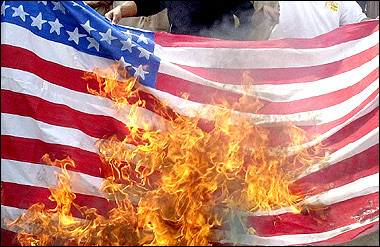Punch a hippie in the face for Freedom
Here's a pretty old post from the blog archives of Geekery Today; it was written about 10 years ago, in 2015, on the World Wide Web.
There are no enforceable laws against flag desecration in the United States. There have been no such laws for over twenty five years. But bring up flag burning and a lot of American nationalists — especially, it seems, political conservatives — will get pretty heated about their right to beat people up who express Patriotically Incorrect political views, or to beat people up just for being a dirty hippie. This kind of appeal to crude instinctual violence only goes so far however, so if the conversation goes on, many of them (more, it seems, in the last few years) will come around to make a claim that it is actually illegal to burn a U.S. flag, and that people can be arrested for doing it. They are completely mistaken about that claim. But it’s interesting, and a bit scary, that they are so pervasively and repetitively and insistently mistaken.
Let’s set aside for the moment the question of whether or not there’s anything wrong with burning a U.S. flag in protest. And let’s set aside for the moment whether or not there’d be anything wrong with burning a U.S. flag in protest if it were illegal. We’ll come back to that later, but it’s a separate question.
Those who claim that burning an American flag is illegal rarely cite a source for this claim. If they do, they will normally point to something like 18 USC 700, on Desecration of the flag of the United States.
[1] What they don’t seem to have noticed is that 18 USC 700 has no legal force. It hasn’t had any legal force for two and a half decades. It’s still printed in copies of the U.S. code, but both that law, and any law substantially like it, were struck down as violations of free speech rights a quarter century ago in Texas v. Johnson and United States v. Eichman. This is not a new development. It’s been the case for decades.
Shared Article from {{meta.siteName}}
UNITED STATES v. EICHMAN (1989).
In 1989, Congress passed the Flag Protection Act which made it a crime to destroy an American flag or any likeness of an American flag which may be “commonly displayed.” The law did, however, allow proper disposal of a worn or soiled flag. Several prosecutions resulted from the Act. Eichman set a flag ablaze on the steps of the U.S. Capitol while protesting the government’s domestic and foreign policy. Another prosecution (United States v. Haggerty) resulted from a flag-burning in Seattle protesting the passage of the Flag Protection Act.Both cases (Eichman’s and Haggerty’s) were argued together.
oyez.org
The claim that flag-burning is illegal or punishable by law is pure nationalist political mythology. There is no enforceable law against flag desecration in the United States. If you claim that there is, you’ve been misinformed, and you are spreading misinformation.
Now, of course, even if there were an enforceable law against desecrating or burning a flag, your own property, whenever you see fit to do so, that law would be a petty tyranny, an obvious and stupid invasion of people’s basic rights to freedom of speech and freedom of conscience. Using force to censor and curtail basic freedom of speech and basic property rights is wrong, and fundamentally unjust, no matter what the law says.
If it were illegal to burn flags, then every one of us would have a perfect right to burn flags in defiance of the law, as an act of civil disobedience against unjust restrictions on free speech. Laws that elevate the symbolism of a piece of cloth over the rights of living people to the integrity of their own minds, their own bodies, and their own property, — laws that propose censorship and punitive force against those whose peaceful protests offend the delicate sensibilities of Patriotic Correctness — deserve nothing but contempt and defiance, whenever and wherever they exist.
But of course they don’t even exist in this case. They’re pure mythology. But myths are created and repeated because they serves a political and cultural function. There’s something worth noting in the fact that so many of the self-appointed Home Guard have a manifest felt need, that they so badly want to believe in a government that can and will use violence to punish offenses against the dignity of their national flag, even in spite of what they could have found out with two minutes’ research on the Internet. This kind of violent Patriotic Correctness is, of course, nothing more than bullying and violent censorship. A form of bullying and violent censorship where many of the bullies and the censors so desperately feel the need for government support that they will conjure non-existent laws to back up their burning desire to punch a hippie in the face. The saddest thing of all is that they will tell you that they do this because the flag means so very much, and it means so very much because it stands for freedom.
That should tell you something about the kind of American Nation, and the kind of freedom,
that they are so exercised to protect against the scourge of peaceful protest and free speech.
My own view of course is that sedition and open disrespect for the government are American traditions, and they deserve to be honored.
Happy Revolution Day weekend.

So perish all compromises with tyranny! And let all the people say, Amen!—William Lloyd Garrison
Also.
- [1]Occasionally they will point to the Federal Flag Code (4 U.S.C Ch. 1 § 5 and following) instead. But the Flag Code is explicitly purely advisory; if you read it, you’ll find that it never claims to be anything more than a list of etiquette and customs that the government specifies as guidance for
such civilians or civilian groups or organizations as may not be required to conform with regulations promulgated by one or more executive departments of the Government of the United States.
It has no legally binding force for anyone who isn’t in the employment of the United States government. You don’t commit any crime by disregarding it and there are no penalties for violating it.↩

Discussed at rrnd.liberty.me /#
RRND - 07/06/15 - Thomas L. Knapp - Liberty.me: